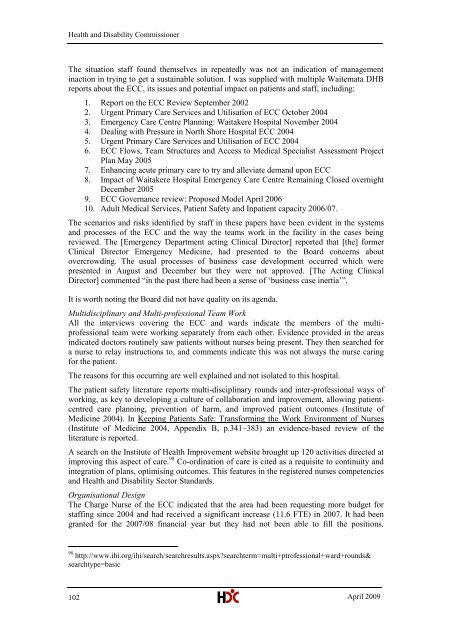North Shore Hospital report - New Zealand Doctor
North Shore Hospital report - New Zealand Doctor
North Shore Hospital report - New Zealand Doctor
Create successful ePaper yourself
Turn your PDF publications into a flip-book with our unique Google optimized e-Paper software.
Health and Disability CommissionerThe situation staff found themselves in repeatedly was not an indication of managementinaction in trying to get a sustainable solution. I was supplied with multiple Waitemata DHB<strong>report</strong>s about the ECC, its issues and potential impact on patients and staff, including:1. Report on the ECC Review September 20022. Urgent Primary Care Services and Utilisation of ECC October 20043. Emergency Care Centre Planning: Waitakere <strong>Hospital</strong> November 20044. Dealing with Pressure in <strong>North</strong> <strong>Shore</strong> <strong>Hospital</strong> ECC 20045. Urgent Primary Care Services and Utilisation of ECC 20046. ECC Flows, Team Structures and Access to Medical Specialist Assessment ProjectPlan May 20057. Enhancing acute primary care to try and alleviate demand upon ECC8. Impact of Waitakere <strong>Hospital</strong> Emergency Care Centre Remaining Closed overnightDecember 20059. ECC Governance review: Proposed Model April 200610. Adult Medical Services, Patient Safety and Inpatient capacity 2006/07.The scenarios and risks identified by staff in these papers have been evident in the systemsand processes of the ECC and the way the teams work in the facility in the cases beingreviewed. The [Emergency Department acting Clinical Director] <strong>report</strong>ed that [the] formerClinical Director Emergency Medicine, had presented to the Board concerns aboutovercrowding. The usual processes of business case development occurred which werepresented in August and December but they were not approved. [The Acting ClinicalDirector] commented ―in the past there had been a sense of ‗business case inertia‘‖.It is worth noting the Board did not have quality on its agenda.Multidisciplinary and Multi-professional Team WorkAll the interviews covering the ECC and wards indicate the members of the multiprofessionalteam were working separately from each other. Evidence provided in the areasindicated doctors routinely saw patients without nurses being present. They then searched fora nurse to relay instructions to, and comments indicate this was not always the nurse caringfor the patient.The reasons for this occurring are well explained and not isolated to this hospital.The patient safety literature <strong>report</strong>s multi-disciplinary rounds and inter-professional ways ofworking, as key to developing a culture of collaboration and improvement, allowing patientcentredcare planning, prevention of harm, and improved patient outcomes (Institute ofMedicine 2004). In Keeping Patients Safe: Transforming the Work Environment of Nurses(Institute of Medicine 2004, Appendix B, p.341–383) an evidence-based review of theliterature is <strong>report</strong>ed.A search on the Institute of Health Improvement website brought up 120 activities directed atimproving this aspect of care. 98 Co-ordination of care is cited as a requisite to continuity andintegration of plans, optimising outcomes. This features in the registered nurses competenciesand Health and Disability Sector Standards.Organisational DesignThe Charge Nurse of the ECC indicated that the area had been requesting more budget forstaffing since 2004 and had received a significant increase (11.6 FTE) in 2007. It had beengranted for the 2007/08 financial year but they had not been able to fill the positions.98 http://www.ihi.org/ihi/search/searchresults.aspx?searchterm=multi+ptrofessional+ward+rounds&searchtype=basic102April 2009
















